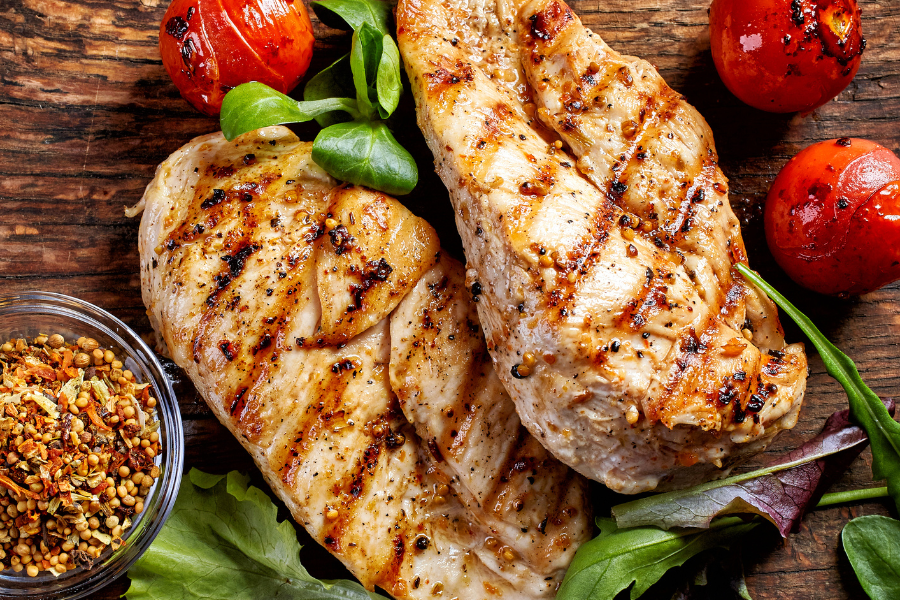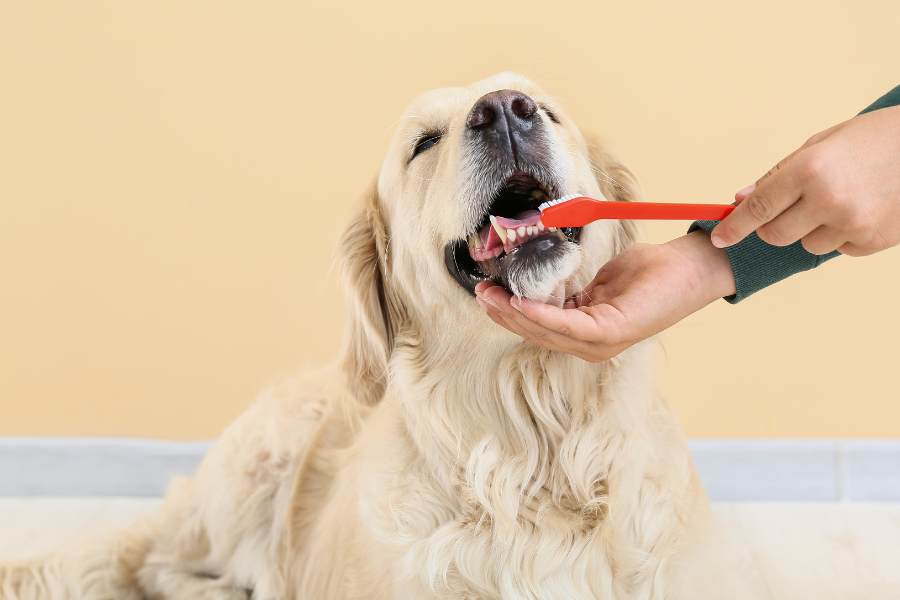Introduction
If you're like me, you've probably wondered, "Can dogs eat chicken?" It's a natural question that pops up if you are a dog owner or dog lover. Especially as you eat a piece of chicken and notice your dog looking at you like "hey, what you got there looks absolutely delicious and I will love you forever if you share just a little bit with me."
We all just want our dogs to be healthy and live their best lives. In this blog we'll chew on the chicken choice for your dog, and more. Is chicken good good for dogs? Are there risks to sharing chicken with a dog? Let's find out!
Why Chicken Could Be a Nutritious Option
Protein Powerhouse
Chicken, first and foremost, is loaded with protein. It is one of the best sources of protein you can find - it's considered a "complete" protein, which means it contains all of the 9 essential amino acids to support health. Protein not only repairs tissues and muscles, but it also produces enzymes and bolsters the immune system. If your dog is active, good sources of protein are a must.
Packed with Vitamins and Minerals
Chicken is also rich in vitamins like B6 and B12, which promote healthy brain function. Plus, it contains niacin, which is excellent for skin and coat health. Essential minerals like phosphorus and selenium are also part of the package, contributing to bone health and immune function.
Easy to Digest
Compared to other meats, chicken is relatively easy for dogs to digest. This makes it an excellent choice for dogs with sensitive stomachs or food allergies. Plain, cooked (we like to boil it) chicken can often be a go-to for dogs experiencing digestive issues.
Potential Risks of Feeding Chicken to Dogs
Risk of Allergies
For most dogs, unseasoned chicken is a safe food, but for a small percentage of dogs it can actually be an allergen. If you're feeding chicken to your dog for the first time, keep an eye out for allergic reactions like itchiness or an upset stomach.
Raw Chicken Concerns
While you may think because dogs are basically wolves, they should be able to eat raw meat - but we do not recommend this. If you are super gung ho about feeding your dog raw meat, at least speak to your vet about it first. Raw chicken can put your dog as risk of bacterial infections like E.coli and salmonella.
Bone Hazards
Do not feed your dog chicken bones. Chicken can easily splinter and puncture a dogs digestive tract, causing serious internal damage or blockages.
How to Safely Prepare Chicken for Your Dog
Boiled Chicken
Our favorite way to prep chicken for our dog is to boil it. It is easy and safe. All you have to do is add chicken to boiling water (again, removing any bones) until fully cooked. Do not add any seasonings (your dog will still love it, we promise), as most spices can irritate your dog's belly.
Grilled Chicken
Grilled chicken can be another good option, provided you skip the seasoning. Make sure it's thoroughly cooked and free from bones. Grilling can add a bit of flavor that your dog will love without compromising their health.
Chicken Broth
Low-sodium chicken broth can be a tasty addition to your dog's meals. Just ensure it’s free of onions and garlic, which are toxic to dogs. Adding broth can make dry kibble more palatable and provide extra hydration.
Portion Control and Frequency
How much chicken should you feed your dog and how often? Good questions! A lot of it depends on your dog - how big they are, their age, and how much they bench press (just kidding, but activity level does matter).
In general, chicken can be a part of your dog's diet, but it should not be the main part. Try incorporating some chicken a few times a week to add variety to their diet. This will provide them with some additional protein but will also will ensure you do not overdo it. Balance is key!
If you need more specific recommendations, we recommend consulting your vet.
Signs Your Dog Loves Chicken
Increased Energy
If your dog seems more energetic and playful after eating chicken, it’s a good sign they’re benefiting from the protein boost. Keep an eye on their overall behavior to gauge how well they’re responding to the new addition.
Shiny Coat
A shiny, healthy coat is often a sign of good nutrition. If you notice your dog's coat looking more vibrant, the vitamins and minerals in chicken could be contributing to this improvement.
Happy Tummy
Less gas, firmer stools, and no signs of discomfort are indicators that chicken agrees with your dog's digestive system. Always monitor their bathroom habits when introducing new foods.
Alternatives to Chicken
Turkey
Turkey is similar to chicken in terms of nutritional benefits. It’s also high in protein and generally well-tolerated by dogs. Just like chicken, ensure it’s cooked plain.
Fish
Fish like salmon and sardines are excellent sources of omega-3 fatty acids, which are great for your dog's skin and coat. Make sure the fish is cooked and free from bones.
Beef
Beef can be a another awesome protein source for pups (and some dogs may even love it more than chicken). Look for leaner cuts of beef and like chicken, ensure the beef is fully cooked before feeding it to your dog.
What About Chicken Skin, Can Dogs Eat That?
Alright, let's talk about chicken skin. I know, I know—those crispy bits can be super tempting, but when it comes to your dog, it's a no-go. Chicken skin is high in fat, which can lead to some serious health problems for your furry friend. Think obesity, pancreatitis, and an upset stomach—not fun at all. Even if your dog gives you those irresistible puppy eyes, it's best to skip the skin and stick to the lean meat. Trust me, your dog will thank you later, and you'll avoid an emergency trip to the vet. So keep it lean and mean, folks!
Can Dogs Eat Chicken Bones?
Nope, they sure can't. Cooked chicken bones are a big no-no for dogs. They can splinter easily and cause choking, blockages, or even puncture your dog's digestive tract. Always play it safe and keep those bones out of reach.
What the Experts Say
Veterinarian Recommendations
Most veterinarians agree that chicken can be a healthy part of your dog's diet when prepared correctly. They recommend plain, cooked chicken without any seasonings. Always consult your vet before making significant changes to your dog's diet.
Nutritionist Insights
Animal nutritionists emphasize the importance of a balanced diet. Chicken is a great protein source but should be part of a varied diet that includes other proteins, vegetables, and grains. This approach ensures your dog gets all the necessary nutrients.
Pet Owners' Experiences
Many pet owners report positive outcomes when feeding their dogs chicken. Enhanced energy, improved coat health, and better digestion are common benefits. However, some have faced challenges with allergies, highlighting the need for careful monitoring.
Common Myths About Dogs and Chicken
Myth 1: Raw Chicken is Healthier
Again, we know their are some raw meat enthusiasts out there, but we are team cooked-chicken. We think the risks of feeding your dog raw meat outweight the potential benefits. Again, if you really want to go raw chicken, we encourage you to speak with your vet first. Raw chicken can carry harmful bacteria (unlike probiotics, with are good bacteria) that pose health risks to both dogs and humans. Cooking chicken kills these bacteria, making it safer for consumption.
Myth 2: Chicken Causes Aggression
There’s absolutely to evidence supporting this rumor. If a dog is exhibiting aggressive behavior, it is probably because of a lack of training.
Conclusion
Alright, to boil the chicken down and sum it up.. Most dogs can definitely eat chicken. Chicken can be a great source of protein and other nutrients to support your dog's overall health, but there are some things to be aware of. Raw chicken can have bacteria that is a risk for your dog, so cooked chicken is the way to go (we believe), be sure to avoid bones, and steer clear of seasonings. And always monitor your dog for any signs of allergies, especially if you are feeding your dog chicken for the first time,
We hope this answers all your questions about feeding chicken to your furry friend. If not, we have a few more FAQ below!
FAQ
Can Dogs Eat Chicken Feet?
Sorry if you think it's gross, but chicken feet are an actual food.. And your dog can chow down on chicken feet! These crunchy little treats are not only safe but also packed with benefits. Chicken feet are a natural source of glucosamine and chondroitin, which are fantastic for joint health and can help keep your dog’s mobility in check. Plus, they're like a natural toothbrush, helping to clean your dog's teeth as they chew. Just make sure the feet are dehydrated or boiled—never feed them raw or seasoned. They might look a bit creepy, but your dog will be thrilled, and you’ll be doing them a solid by keeping those joints strong and teeth clean.
Can Dogs Eat Chicken Nuggets?
We all know those tasty bites are a guilty pleasure for us humans, but should you really be sharing them with your dog? Spoiler alert: it's not the best idea. Chicken nuggets are loaded with unhealthy fats, salt, and seasonings that can wreak havoc on your dog's digestive system. Plus, the breading and frying process often involves ingredients that are far from dog-friendly. So next time, save those nuggets for yourself and keep the chicken pure and simple for your furry friend.
Can Dogs Eat Chicken Gizzards?
Oh, heck yes they can! Chicken gizzards are like a hidden gem in the world of dog treats. Packed with protein, vitamins, and minerals, gizzards are a super nutritious addition to your dog's diet. They're especially rich in glucosamine, which helps maintain joint health—perfect for those zoomies and long walks. Just make sure to cook them thoroughly to avoid any potential bacteria. Toss them into your dog's meal or serve them as a special treat; either way, your pup is in for a tasty, nutrient-packed delight!
Can Dogs Eat Rotisserie Chicken?
Rotisserie chicken can be shared with your furry friend, but there are a few caveats to keep in mind. First off, the seasoning is a no-go. All those delicious herbs and spices we love can be harmful to dogs. Garlic, onion, and too much salt can mess up their digestive system and even be toxic. Strip off any seasoned skin and only give them the plain, unseasoned meat.
And let's talk about the bones—take them out, no exceptions.
References
1) Marangoni F, Corsello G, Cricelli C, Ferrara N, Ghiselli A, Lucchin L, Poli A. Role of poultry meat in a balanced diet aimed at maintaining health and wellbeing: an Italian consensus document. Food Nutr Res. 2015 Jun 9;59:27606. doi: 10.3402/fnr.v59.27606. PMID: 26065493; PMCID: PMC4462824.



